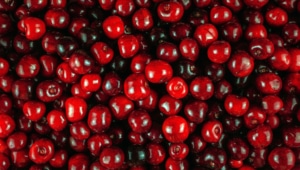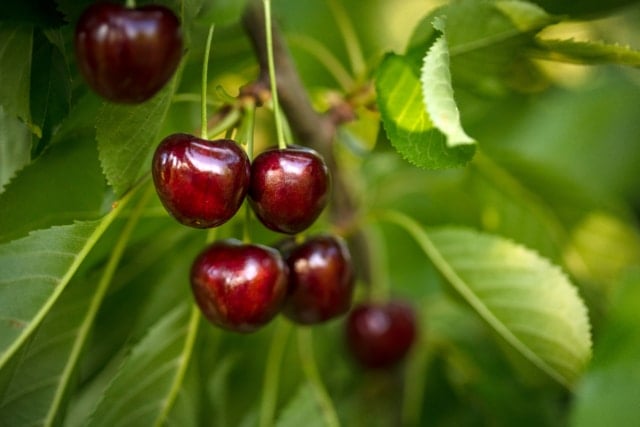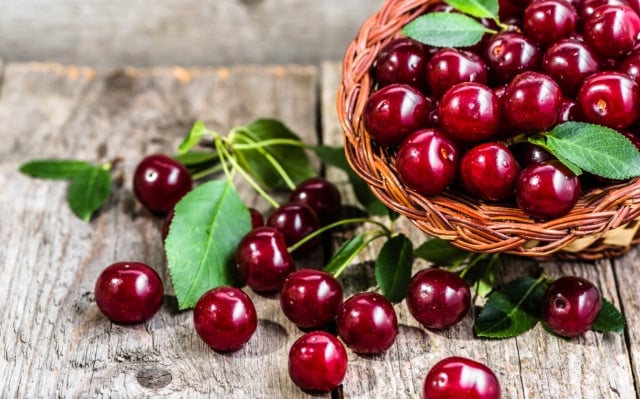6 Health Benefits of Cherries & 3 Recipe Ideas

With their visually pleasing colors and countless health benefits, cherries have become coveted fruits in the culinary world. To honor such an influential fruit, we’re coming to you with a comprehensive post that covers all things cherries. Find here the health benefits of cherries and tasty recipes.
We know cherries are delicious, snackable, and flexible. That’s why we eat them. However, they’re not perfect by any means. So, today, we delve deep into the history, benefits, and potential risks of cherries to help you decide if they’re good for you.
Interesting Facts About Cherries

Interesting Facts About Cherries
Let’s start laying the groundwork by covering a few interesting facts about cherries. Most of us know how cherries taste and look. Have you ever wondered where they originated, though? Who introduced such a flexible plant? That’s what we cover in this section.
The Origin

The Origin
The earliest record we have of cherries is the History of Plants, a 3rd-century BC book written by Aristotle’s friend, Theophrastus.
In the book, Theophrastus states that the Greeks were the first to plant cherries and had been doing it for hundreds of centuries.
Over time, cherries reached the Romans, and they started planting them on a bigger scale.
The first time sweet cherries made an appearance in America, however, was in 1847. Henderson Lewellings didn’t settle for growing one or two cherry plants.
He planted an entire orchid on his farm, which later became famous for its sweet cherry production. Five years later, Peter Dougherty rose to the scene. The Presbyterian missionary grew the first Montmorency cherry on Old Mission Peninsula.
Although his fellow farmers didn’t believe the plant would produce something worthwhile, they were quickly proven wrong. It produced luxurious cherries, stimulating his colleagues to invest in cherry plants.
Where Do Cherries Grow?

Where Do Cherries Grow?
Cherries aren’t picky. They just need a sunny location with proper air circulation. That’s why Turkey and the U.S. are responsible for most of the cherry production in the world. That’s especially true for the U.S., as it plants around 650 million pounds a year.
Tart cherries are a bit different, though. Yes, America still produces millions of pounds, but they’re more common in Southern and Eastern Europe.
When Are Cherries in Season?

When Are Cherries in Season?
The peak season of cherries extends from late spring to early summer. That’s usually from May to August. You want to harvest sweet cherries earlier in the season and pick sour cherries at the end.
How Many Carbs Are in Cherries?
One cup of sweet cherries contains 24.7 grams of total carbs (18.2 net carbs). A cup of sour cherries, on the other hand, contains 18.9 grams of total carbs (14.8 net carbs).
Types of Cherries

Types of Cherries
Although many consume cherries as part of their daily diet, they may not be able to differentiate between the countless variations—but that’s what we’re here for.
Amarena Cherries

Amarena Cherries
Famous for their dark color and sour taste, amarena cherries are an excellent companion to various pastries and ice cream.
Manufacturers store amarena cherries in water, sugar, stabilizers, and citric acid for one month to reach that color and flavor.
Besides their incredible taste, they offer impressive health benefits. Not only are they fat-free, but they’re also an excellent source of magnesium, iron, and fiber.
Maraschino Cherries

Maraschino Cherries
When they first came out, maraschino cherries took the market by storm.
You can see people adding them to cocktails, ham, cookies, and more. However, they didn’t always look the way they do now.
At first, maraschino cherries looked like their amarena counterpart, dark and sour. Now, they’re artificially colored and brined to look vibrant and gain a sweet flavor.
Montmorency Cherries

Montmorency Cherries
When you look at Montmorency cherries for the first time, you might mistake them for small tomatoes. After all, they both have the same light, vibrant red color.
That sweet-sour cherry variant is common in the U.S. and Canada. They come fresh, canned, or frozen.
Are you familiar with the classic sour cherry pie, for instance? That’s usually the type of cherries used to make it.
Nutritional Facts, Calories and Protein of Cherries

Nutritional Facts, Calories and Protein of Cherries
Despite being small, cherries carry multiple nutrients that you need on a regular basis.
One cup of cherries contains 97 calories, which is excellent for weight management, 2 grams of protein, 3 grams of dietary fiber and 10 percent of the daily value of potassium.
Whether it’s boosting your immune system, regulating your blood pressure, or promoting skin health, cherries have much to offer you.
Health Benefits of Eating Cherries: Why It Is So Good for You

Health Benefits of Eating Cherries: Why It Is So Good for You
We’re sure some of you don’t care about numbers and percentages. You want to know the potential health benefits of cherries. Don’t worry. We got that covered, too.
Reduces the Risk of Heart Disease

Reduces the Risk of Heart Disease
As kids, we were told to eat all sorts of fruit to grow a strong body. That wasn’t just a trick from our parents to get us to eat healthy. A diet rich in fruit, especially stone fruit, is effective in reducing the risk of heart disease. How?
Cherries are a rich source of vitamin C, which prevents fat and cholesterol from building up in the artery walls. So you don’t have to worry about potential strokes or heart attacks.
Rich in polyphenol antioxidants, cherries improve the functions of the heart and blood vessels as well.
They can also raise the high-density lipoprotein cholesterol (good cholesterol) and reduce the low-density lipoprotein cholesterol (bad cholesterol). That lowers the risk of cardiovascular diseases.
Additionally, polyphenol antioxidants contain anthocyanins, flavonols, and catechins, which can help protect your heart against cellular damage. A 2018 study showed that high intakes of these substances lower the risk of heart disease for the following five years.
Offers You a More Comfortable Sleep Experience

Offers You a More Comfortable Sleep Experience
Look: cherries aren’t a magical cure for insomnia. They can help if you’ve been having trouble sleeping, though. So, how does it work?
Cherries are rich in acyl lipids, nucleotides, and amino acids. These plant compounds can make you fall asleep quicker and reduce the risk of waking up in the middle of the night.
Additionally, cherries are a great source of melatonin, aka “the sleeping hormone.” As the name suggests, it’s an influential factor in your sleep cycle.
You see, when it gets dark, the melatonin levels in your body rise, signaling it’s time to sleep.
It attaches itself to various brain receptors to slow down your brain’s activity, making it easier for you to fall asleep. It can also lower the dopamine levels in your brain. And yes, we know that dopamine is associated with pleasure and happiness.
The problem is that it can make you more alert, which helps you stay awake. Lowering the dopamine levels in your brain can make it easier for you to go to sleep.
In 2018, a group of researchers tested the sleep-inducing effects of cherries on elderly experiencing insomnia. The results showed that consuming a cup of tart cherry juice before bed increased their sleep time by 1 hour 24 min. They also had more restful sleep than usual.
Contains Antioxidants and Anti-inflammatory Mediators

Contains Antioxidants and Anti-inflammatory Mediators
Ultimately, all cherries aren’t born equal. Each type contains different nutrients, vitamins, and minerals. However, all cherries are loaded with powerful antioxidants and anti-inflammatory mediators.
The biggest advantage to consuming fruit with antioxidant and anti-inflammatory properties is lowering the risk of oxidative stress.
The anthocyanin pigments in cherries form complexes that can protect you from the various chronic conditions associated with oxidative stress.
These include cancer, heart failure, and Parkinson’s disease. That said, anthocyanins aren’t the only substances that offer that type of protection. Vitamin C and beta-carotene in cherries also have anti-inflammatory and antioxidant characteristics.
As we’ve already established, cherries are rich in polyphenol antioxidants. Besides promoting heart health, they can prevent chronic inflammation, protecting you from asthma and Alzheimer’s disease.
Treats Muscle Soreness

Treats Muscle Soreness
This one’s for our gymaholic friends. Have you ever overworked your muscles to the point of soreness? We’ve all been there. Well, let us tell you that cherry products make for an excellent gym companion.
The antioxidants and anti-inflammatory mediators in them can treat the soreness and pain following your workout.
Besides stimulating muscle recovery, consuming tart cherry juice can make you lose strength slowly. That’s especially helpful with marathon runners and cyclists.
A 2018 study showed the effects of tart cherry juice in relieving the exhaustion of exercise. Researchers split twenty women into two groups. One drank 60 ml twice a day, while the other consumed a placebo.
Both groups had to do repeated sprints and muscle-straining exercises.
Compared to the placebo group, those who drank cherry juice experienced less muscle pain and quicker recovery after their workout.
What if we tell you that cherry products can even go as far as boosting your athletic performance?
In 2016, researchers divided 27 endurance-trained runners into two groups.
One had to consume rice flour placebo capsules, while the other ingested powdered tart cherries for ten days. The results?
In a half-marathon run, the powdered tart cherries group had a 13% faster finish time. They also accumulated less muscle damage after the race.
Reduces the Symptoms of Arthritis

Reduces the Symptoms of Arthritis
You’re probably sick of us talking about the anti-inflammatory compounds in cherries at this point, but we’ll keep mentioning them anyway. Yes, these mediators can reduce joint pain in people with arthritis.
You see, oxidative stress doesn’t just kill your cells. It can also cause arthritis. So, as cherries reduce oxidative stress, they reduce the stiffness and swelling of that inflammation as well – and that’s just scratching the surface.
People with gout (inflammatory arthritis) know that it comes from the accumulation of uric acid in your bloodstream. Well, those people will be happy to know that cherries can reduce uric acid levels in the body.
Not only does this lower the risk of gout attacks, but it also makes them less extreme when they occur. A 2003 study covered that point specifically. Researchers had ten women eat 280 grams of sweet cherries after fasting overnight.
These women experienced a drop in the C-reactive protein, which indicates lower levels of inflammation. They also started producing less uric acid five hours after consuming cherries.
Can Manage Your Diabetes

Can Manage Your Diabetes
Don’t worry. We won’t mention the anti-inflammatory mediators this time. However, we’ll focus on polyphenol antioxidants again.
And sorry, but before we delve into how cherries can manage your diabetes, it’s time for a short biology lesson:
When you consume food with carbohydrates, your body breaks them down into sugar. As the glucose enters the bloodstream, raising your blood sugar levels, your pancreas releases the insulin hormone.
Insulin moves the sugar from the bloodstream to your cells, where they can use it as energy. So, what’s cherries’ role in this process? Polyphenol antioxidants prevent the carbohydrates in food from breaking down into simple sugars.
That means less glucose enters your blood, preventing your sugar levels from spiking after carbohydrate-rich meals. These compounds can also help your body produce more insulin, lowering your blood sugar levels.
A 2017 study shows that consuming cherries on a regular basis lowers the risk of having type 2 diabetes over the following 2-4 years by 57 percent.
Potential Risks of Cherries

Potential Risks of Cherries
Despite everything we’ve covered so far, cherries aren’t magical fruits that can protect you from all the diseases of the world. They come with multiple risks, and you need to know what they are before making them a part of your diet.
Can Cause Stomach Problems

Can Cause Stomach Problems
Since they’re rich in fructose and sorbitol, the Food Intolerance Diagnostics organization labels cherries as a FODMAP.
That’s a specific carbohydrate that your intestine faces difficulty absorbing. Unfortunately, that might be the least of your problems.
During digestion, your body turns FODMAP into gut bacteria, which promotes gas releases. That’s especially true for people with irritable bowel syndrome. They have more bacteria in their small intestine, which makes them more susceptible to gas releases.
Since the fructose in cherries directs water to your gastrointestinal tract, cherries can also cause bloating, which makes your stomach feel tight.
That can affect the muscles in your bowel wall, causing uncomfortable bowel movements, so you might experience stomach ache.
Here’s the bigger problem, though: Drawing water into your intestines can also loosen your bowel movements. In other words, it can cause diarrhea. So, if you have any digestion issues, we recommend steering away from cherries.
Can Stimulate an Allergic Reaction

Can Stimulate an Allergic Reaction
Cherry allergies aren’t as common as other types of allergies. Here’s the catch: You don’t have to be allergic to the fruit itself (primary allergy) for your body to reject it.
People with pollen allergies can develop a secondary allergy to fruits that contain similar proteins, like cherries, later on.
A cherry allergy includes the following symptoms:
- Itching in the mouth, tongue, ears, or lips
- Swelling in the mouth, the entire face, or underneath the skin
- Hives in the mouth
- Extreme abdominal discomfort
- Having difficulty breathing
- Nausea, vomiting, dizziness, and fainting
- Nasal congestion
- Skin rashes
Can Spike Your Blood Sugar Levels

Can Spike Your Blood Sugar Levels
You’re probably confused right now. We just dedicated an entire section to covering how beneficial cherries are for diabetics.
Some might think: “I just need to consume as many cherries as possible to regulate my blood sugar levels.”
No, that’s a recipe for disaster. As we’ve already established, the more carbohydrates you consume, the more sugar enters your bloodstream.
So, you need to match your daily cherry intake to what’s recommended by your doctor. That includes checking how many carbs are in a cherry serving. We’ll make it easy for you too.
One cup of fresh sweet cherries contains 25 grams of carbs, while a cup of pitted sour cherries contains 19 grams. We recommend steering away from canned cherries. They usually include juice and syrup, which makes them sweeter. One cup includes 60 grams of carbs.
The British Diabetic Association recommends consuming 14 fresh cherries a day. However, sugar tolerance differs from one diabetic patient to another, so consult your doctor to identify the proper serving.
Are Cherries in Pregnancy Good for You?

Are Cherries in Pregnancy Good for You?
With everything we’ve covered so far, it’s no wonder cherries are an excellent source of essential nutrients for pregnant women.
The Benefits of Cherries During Pregnancy

The Benefits of Cherries During Pregnancy
It provides pregnant women with fiber, potassium, vitamin C, and folic, all of which can contribute to growing a healthy baby.
Folic is especially crucial because it prevents birth abnormalities in babies’ brains and spines. It also contributes to the formation of the neural tube.
Here’s a not-so-fun fact: Your body isn’t always a safe space for your fetus.
The metabolic process in your body creates molecules called free radicals, which can harm your fetus on a cellular level. However, the antioxidants in cherries can neutralize the effect of those radicals.
The potassium content in cherries can also help regulate blood pressure, lowering the risks of dangerous complications or premature delivery.
One of the most troublesome aspects of pregnancy is that women’s immune systems become more compromised. Well, cherries are rich in vitamin C, which supports their immune systems, combating potential infections and diseases.
Another common disadvantage of pregnancy is the joint pain that comes with weight gain and the production of the relaxin hormone. However, anthocyanin and antioxidant content can help reduce that pain. They can also reduce the effects of constipation, insomnia, and migraines.
The Risks of Cherries During Pregnancy

The Risks of Cherries During Pregnancy
Cherries aren’t 100 percent safe for pregnant women because they contain a chemical compound called cyanide. That compound can cause fetal malformations in the fetus and potential abortions.
While the cyanide content in cherries isn’t high enough to have such an effect, it’s still something to be wary of. It’s also worth noting that different types of cherries have different components.
A fresh cherry is safe and healthy to eat. However, if you’re dealing with dried cherries, you have to read the label first. That’s because manufacturers can sometimes add sulfur dioxide to their recipe, which can cause birth abnormalities.
Can Dogs and Cats Eat Cherries?

Can Dogs and Cats Eat Cherries?
The flesh of cherries itself isn’t harmful. The problem lies within the pits, as they carry the cyanide content. Yes, it’s not just harmful for pregnant women.
It can also cause intestinal blockage in dogs and prevent your cat from absorbing oxygen.
Since they’re high in sugar, cherries can cause obesity, diabetes, and cavities for your dog.
Although a single cherry doesn’t contain enough cyanide content to cause serious damage to your pets, it’s best to avoid them altogether.
That said, not all cherries are harmful. If your cat or dog eats seedless/pitless cherries, they’re less likely to experience any trouble. You might still want to look for signs of sickness in the following days, though.
Delicious Recipe Ideas With Cherries

Delicious Recipe Ideas With Cherries
Now that we’ve covered all our bases, it’s time to teach you a few delicious cherry recipes.
Chocolate-Covered Cherries

Chocolate-Covered Cherries
Despite its fancy look, this recipe is beginner-friendly. And there’s more to it than dipping cherries in chocolate. Here’s what you’ll need:
- 2½ cups powdered sugar
- 8 ounces maraschino cherries (leave the stems)
- ¼ cup soft butter
- 2 cups semi-sweet chocolate chips
- 1 tbsp 2% milk
- 2 tbsp shortening
- ½ tsp almond extract
The first step in making chocolate-covered cherries is preparing the dough.
The Dough

The Dough
Mix your butter, almond extract, sugar, and milk together until you get a smooth dough. Split it into 1-inch balls, then flatten them into 2-inch circles.
Tightly wrap your dough circles around the cherries, then put them on a baking sheet with wax paper. Put the cherries in the fridge for a few hours to harden. Now it’s time to prepare the chocolate dip.
The Dip
Put the chocolate chips and shortening in a bowl and put them in the microwave for 20 seconds. Take the bowl out, stir the chocolate, then put it back in for another 20 seconds. Keep repeating the process until you get a smooth mixture.
Putting It All Together

Putting It All Together
While holding the stem of the dough-covered frozen cherries, dip them in the chocolate, allowing them to get fully covered.
Gently shake off the excess chocolate, then put them on another baking sheet with wax paper and let them cool off. Now, all that’s left is to store them in an airtight container and put them in the fridge for two weeks.
Summer Fruit Salad With Cherries

Summer Fruit Salad With Cherries
You don’t have to be Gordon Ramsay to make a fruit salad. It’s just an assembly of different fruits. However, since we’re using cherries, you want to make sure you’re using complementary fruits.
We recommend combining pitted cherries, strawberries, blueberries, raspberries, and peaches. The amount of fruit you use depends on how big you want the salad bowl to be.
We’ll add a little twist that takes this recipe to another level: A sweet syrup. Mix 1 tbsp lemon juice, 1 tsp maple syrup, ½ tsp of grated ginger, and a pinch of salt in a small bowl. Put the fruit together and pour the mixture on top.
Tips for Using Cherries

Tips for Using Cherries
You’re pretty much a cherry expert at this point. That doesn’t mean we can’t offer you a few tips on using cherries, though.
How to Store Cherries
Cherries can only last 3 to 4 days at room temperature, so keeping them in the freezer or the refrigerator is the best way to store them.
Refrigerating

Refrigerating
Refrigerating cherries is pretty straightforward. Store them in an airtight container, but don’t put the lid on. Sealing the container helps moisture form faster, which can spoil the cherries. Put paper towels over the cherries and place the container in the fridge.
Freezing

Freezing
Freezing cherries is a bit more complex than refrigerating them. Start by washing them thoroughly, then place them on a baking sheet with parchment paper.
Put the baking sheet in the freezer for two hours to prevent your cherries from sticking together later on. Take them out, put them in an airtight container, and refreeze them.
How to Make Cherry Syrup

How to Make Cherry Syrup
Eating cherries isn’t the only way to enjoy their sweet taste. You can spice things up with a cherry syrup. The best part? You can make it with five simple ingredients:
- 1 cup water
- 2 tbsp butter
- 2½ sugar
- 12 ounces cherries
- ½ tsp almond extract
Add the cherries and water to a saucepan on low heat and let them simmer for 20 minutes. Add the sugar and butter, then let them cook until the sugar dissolves.
Remove the saucepan, then add almond extract to your mixture. Let it rest, pour it into an airtight container, then refrigerate for two weeks.
- Tomato Juice. Health Benefits + Tips.
- Asparagus. Benefits for Your Health.
- Mango. Benefits and Side Effects.
- Onions. Health Benefits and Tips for Use.
- Spinach. Benefits and Exctiting Facts.
- Peanuts. Health Benefits & Tips and Hacks.
- Dark Chocolate. Health Benefits and Tips.





